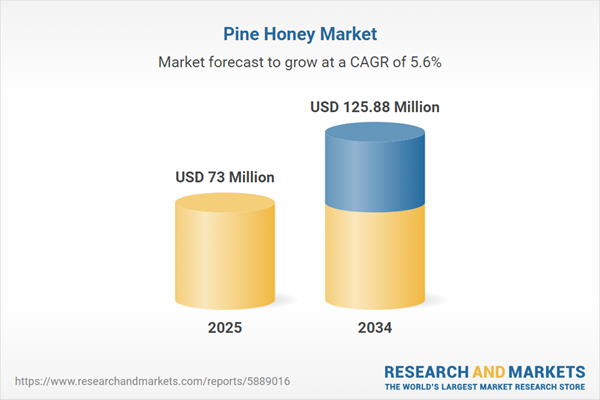The demand in the industry is increasing due to subtle taste and aroma of the product, and its low crystallisation tendency and high thickness in comparison to honey from any other source. Also, the increasing health consciousness is driving the market growth of pine honey.
Market Segmentation
Pines are evergreen, coniferous resinous trees, from which honey can be obtained. Honey retains most of the vitamins and minerals of its source, and hence, pine is an optimal candidate for the production of monofloral honey due to its properties. Pine honey has anti-inflammatory, antibacterial, and antioxidant properties. The pine honey market can be divided based on segments like product type, application and region.The industry can be divided on the basis of its product type as:
- Extracted Pine Honey
- Pressed Pine Honey
- Comb Pine Honey
The pine honey market can be broadly categorised based on its application into:
- Food and Beverage
- Food Additives
- Others
Market Breakup by region:
- North America
- Europe
- Asia-Pacific
- Latin America
- Middle East and Africa
Market Analysis
The rising awareness about gluten and celiac diseases is driving the demand for gluten-free products, including pine honey. The growing awareness regarding various health benefits from the consumption of the honey is further aiding the pine honey market. Factors such as low-price, increased demand for natural products and ingredients, growing popularity of vegan diet, increasing production of honey, and increasing applications of the product is expected to aid the pine honey market over the next five years.Competitive Landscape
The report presents a detailed analysis of the following key players in the global pine honey market, looking into their capacity, market shares, and latest developments like capacity expansions, plant turnarounds, and mergers and acquisitions:- Barkman Honey
- Bee Maid Honey
- Beeyond the Hive
- Billy Bee Products
- Capilano Honey
- Comvita
- Dabur
- Others
Table of Contents
Companies Mentioned
The key companies featured in this Pine Honey market report include:- Barkman Honey LLC
- Beemaid Honey Limited.
- Beeyond the Hive LLC
- Billy Bee Honey Products Company
- Capilano Honey Ltd.
- Comvita Ltd.
- Dabur
Table Information
| Report Attribute | Details |
|---|---|
| No. of Pages | 180 |
| Published | August 2025 |
| Forecast Period | 2025 - 2034 |
| Estimated Market Value ( USD | $ 73 Million |
| Forecasted Market Value ( USD | $ 125.88 Million |
| Compound Annual Growth Rate | 5.6% |
| Regions Covered | Global |
| No. of Companies Mentioned | 8 |









